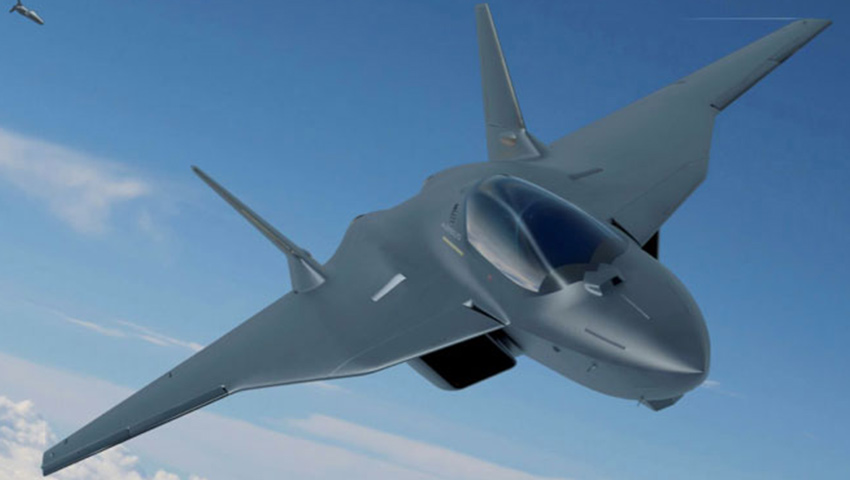European aerospace companies, Airbus, Dassault, Safran and MTU Aero Engines have partnered to initiate a series of joint concept study (JCS) agreements to begin the development phase of the sixth-generation Future Combat Air System (FCAS).
To continue reading the rest of this article, please log in.
Create free account to get unlimited news articles and more!
France and Germany have awarded the first-ever contract – a JCS – to Dassault Aviation and Airbus for the first stage of the Future Combat Air System (FCAS) programme.
The launch of the JCS was announced by the French Minister of the Armed Forces, Florence Parly, and her German counterpart, Ursula von der Leyen, at a meeting in Paris, marking the first major steps towards the European development of a sixth-generation combat aircraft. The decision by both countries represents a milestone to secure European sovereignty and technological leadership in the military aviation sector for the coming decades.
Eric Trappier, chairman and CEO of Dassault Aviation, said, "This new step is the cornerstone to ensure tomorrow’s European strategic autonomy. We, as Dassault Aviation, will mobilise our competencies as system architect and integrator, to meet the requirements of the nations and to keep our continent as a world-class leader in the crucial field of air combat systems."
This planned Next Generation Weapons System will consist of a highly capable manned 'New Generation Fighter' (NGF) teaming with a set of new and upgraded weapons as well as a set of unmanned systems (remote carriers) linked by a Combat Cloud and its ecosystem embedded in a system-of-systems FCAS architecture.
"FCAS is one of the most ambitious European defence programs of the century. With today’s contract signature, we are finally setting this high-technology program fully in motion. Both companies are committed to providing the best solutions to our nations with regard to the New Generation Fighter as well as the systems of systems accompanying it. We are truly excited about having been given this opportunity and appreciate the trust placed in both our companies," Dirk Hoke, CEO of Airbus Defence and Space, explained.
The signing of the JCS between Airbus and Dassault was followed by an industrial partnership agreement between Safran and MTU Aero Engines to lead the development, production and after-sales support activities for the new engine, which will power the next-generation combat aircraft, as part of the Franco-German Future Combat Air System.
In the frame of this partnership, Safran Aircraft Engines will take the lead in engine design and integration, and MTU Aero Engines will take the lead in engine services.
The existing joint venture Aerospace Embedded Solutions (AES) will be in charge of the engine control hardware and software under the responsibility and the lead of engine integrator (Safran Aircraft Engines), the intention is to achieve a balanced French–German industry program share, assuming balanced funding by France and Germany.
Philippe Petitcolin, CEO of Safran, said, "Through this collaboration, which represents a step forward, we manifest that Safran is going to play a leading role in the construction of a European defence industry."
This was expanded upon by Olivier Andriès, CEO of Safran Aircraft Engines, who added, "By teaming up with MTU Aero Engines, we will combine our respective areas of expertise according to the 'best athlete' principle, while also generating strong synergies to foster innovation. Safran has proven its ability to fully develop, produce and support military aircraft engines over the last six decades."
MTU Aero Engines will be in charge of the low and high-pressure compressors and the low-pressure turbine, while Safran will be responsible for combustor, high-pressure turbine and the afterburner.
Reiner Winkler, CEO of MTU Aero Engines, welcomed the expanded industrial partnership between Safran and MTU Aerospace, saying, "Safran Aircraft Engines and MTU Aero Engines are natural partners for this French-German collaboration. Both companies have specific experience in developing fighter engines, along with a history of partnership reaching back over 50 years."
"Along with Safran Aircraft Engines, and based on our technological know-how, we feel that we are fully capable of delivering a state-of-the-art propulsion system. The key to success will be starting a technology and demonstrator program by mid-year," added Michael Schreyögg, chief program officer at MTU Aero Engines.
FCAS is expected to enter into service by 2040 and has been designed to be more than a combat aircraft, the FCAS is expected to serve as part of a system of systems, consolidating an array of interconnected and interoperable elements, including unmanned medium altitude, long endurance (MALE) drones, the existing fleet of Eurofighter and Rafale fighter aircraft, cruise missiles and drone swarms.
The FCAS system will serve as a critical component of a connected and interoperable system with a vast perimeter of specialist mission aircraft, satellites, NATO systems and a distributed network of land and naval combat systems. FCAS is designed to assure European autonomy in the air and space domain, while enhancing existing political, strategic and industrial partnerships in Europe.
Airbus is a global leader in aeronautics, space and related services, providing tanker, combat, transport and mission aircraft, as well as one of the world’s leading space companies.
With over 10,000 military and civil aircraft delivered in more than 90 countries over the last century, Dassault Aviation has built up expertise in the design, development, sale and support of all types of aircraft, ranging from the Rafale fighter, to the high-end Falcon family of business jets and military drones.
Safran Aircraft Engines designs, produces and sells, alone or in partnership, commercial and military aircraft engines offering world-class performance, reliability and environmental-friendliness.
MTU Aero Engines a leading German engine manufacturer in low-pressure turbines, high-pressure compressors, turbine centre frames as well as manufacturing processes and repair techniques.
Australia's industrial capability and value adding capacity as developed throughout the F-35 program places Australia in an ideal position to integrate and participate in the development of any number of sixth-generation fighter designs to ensure continued air combat capability and interoperability with key regional and global allies in increasingly contested environments, beyond 2030.

 Login
Login







